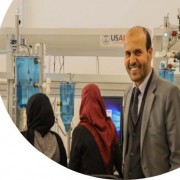Speeches Shim
Coronavirus is shutting down schools and affecting learning opportunities for over 1.5 billion children and youth around the globe. The global pandemic has stunned education systems worldwide: How do we ensure the continuity of our children’s academic education? Is virtual learning the solution?
In Morocco, a Ministry of Education cadre of experts that benefited from previous USAID-funded distance learning activities responded, “Yes!” While Morocco’s school buildings are closed, one million students have already accessed the Ministry’s online learning platform and lessons broadcast nationally on TV, opening the door to continued learning for millions more of Moroccan youth.
USAID/Morocco is at the forefront of locally led development within the Agency, finding ways to succeed with a limited budget in a diverse and complex development context. In 2015, it became one of the first Missions involved in the Local Works Program, a USAID initiative that provides funds to Missions to pursue locally owned programming and innovative operational approaches. This brief provides a summary of USAID/Morocco’s experiences to date with locally led development, lessons learned, and recommendations based on its experience.

USAID addresses gender as a cross-cutting issue with a focus on increasing women’s political and economic inclusion in Morocco. Nearly every activity under the current strategy has a plan to address gender issues.

Recognizing water as a national security issue for Morocco and its neighbors in the region, USAID is using innovation and technology to establish state of the art and sustainable water management practices in Morocco. The H2O Maghreb activity implements cutting edge solutions to urgent water needs in Morocco and the region, while improving the skills and employability of young Moroccans by providing them with a market-driven training program in a newly established water training hub.

Ms. Benour observed that a few months after the introduction of the USAID reading program she quickly understood why her students could not learn using her traditional teaching methods. “I simply did not teach them the way they learn at their age,” she noted. “USAID’s phonics-based approach of reading instruction has opened my eyes to their basic learning needs. Instead of imposing word recognition on them like I used to do, they first need to learn to read and spell using phonics and understand the relationship between letters and sounds.”


Comment
Make a general inquiry or suggest an improvement.